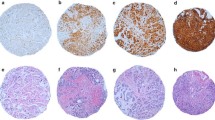Abstract
Background and objectives
In breast cancer, the expression pattern of CXCR4 may be correlated with the degree of axillary lymph node involvement. The aim of this study was to evaluate the contributing factors that contribute to the correlation between CXCR4 expression and axillary lymph node metastasis in breast cancer.
Methods
Between August 1997 and August 2002, sections of paraffin-embedded tissue were obtained from 107 patients who received optimal treatment for breast cancer. The expression of CXCR4 was evaluated by immunohistochemical staining.
Results
A significant correlation was found in the expression of nuclear CXCR4 and lymph node metastasis (P = 0.03). We found a significant correlation between a high nuclear expression of CXCR4 and axillary lymphatic metastasis in estrogen and progesterone receptor negative breast cancer (P = 0.01 and P = 0.01). There was a significant correlation between the high expression of nuclear CXCR4 and axillary lymphatic metastasis in comparisons between positive estrogen and/or progesterone receptor expression and negative expression (P = 0.02).
Conclusions
Our results showed that high expression of nuclear CXCR4 was significantly correlated with lymph node metastasis in breast cancer. The high expression of nuclear CXCR4 in hormone receptor negative breast cancer was associated with a high possibility of lymph node metastasis.

Similar content being viewed by others
References
Chua B, Ung O, Taylor R, Boyages J. Frequency and predictors of axillary lymph node metastases in invasive breast cancer. ANZ J Surg 2001;71(12):723–8
Silverstein MJ, Skinner KA, Lomis TJ. Predicting axillary nodal positivity in 2282 patients with breast carcinoma. World J Surg 2001;25(6):767–72
Feng Y, Broder CC, Kennedy PE, Berger EA. HIV-1 entry cofactor: functional cDNA cloning of a seven-transmembrane, G protein-coupled receptor. Science 1996;272(5263):872–7
Murdoch C. CXCR4: chemokine receptor extraordinaire. Immunol Rev 2000;177:175–84
Nagasawa T, Tachibana K, Kishimoto T. A novel CXC chemokine PBSF/SDF-1 and its receptor CXCR4: their functions in development, hematopoiesis and HIV infection. Semin Immunol 1998;10(3):179–85
Rossi D, Zlotnik A. The biology of chemokines and their receptors. Annu Rev Immunol 2000;18:217–42
Muller A, Homey B, Soto H, et al. Involvement of chemokine receptors in breast cancer metastasis. Nature 2001;410(6824):50–6
Fernandis AZ, Prasad A, Band H, Klosel R, Ganju RK. Regulation of CXCR4-mediated chemotaxis and chemoinvasion of breast cancer cells. Oncogene 2004;23(1):157–67
Bachelder RE, Wendt MA, Mercurio AM. Vascular endothelial growth factor promotes breast carcinoma invasion in an autocrine manner by regulating the chemokine receptor CXCR4. Cancer Res 2002;62(24):7203–6
Kang H, Watkins G, Douglas-Jones A, Mansel RE, Jiang WG. The elevated level of CXCR4 is correlated with nodal metastasis of human breast cancer. Breast 2005;14(5):360–7
Greene FL, Page DL, Fleming ID, et al. AJCC Cancer Staging Manual 6th edition. New York: Springer, 2002
Zlotnik A. Chemokines in neoplastic progression. Semin Cancer Biol 2004;14(3):181–5
Butcher EC, Williams M, Youngman K, Rott L, Briskin M. Lymphocyte trafficking and regional immunity. Adv Immunol 1999;72:209–53
Campbell JJ, Butcher EC. Chemokines in tissue-specific and microenvironment-specific lymphocyte homing. Curr Opin Immunol 2000;12(3):336–41
Hao L, Zhang C, Qiu Y, et al. Recombination of CXCR4, VEGF, and MMP-9 predicting lymph node metastasis in human breast cancer. Cancer Lett 2007
Su YC, Wu MT, Huang CJ, Hou MF, Yang SF, Chai CY. Expression of CXCR4 is associated with axillary lymph node status in patients with early breast cancer. Breast 2006;15(4):533–9
Kato M, Kitayama J, Kazama S, Nagawa H. Expression pattern of CXC chemokine receptor-4 is correlated with lymph node metastasis in human invasive ductal carcinoma. Breast Cancer Res 2003;5(5):R144–50
Spano JP, Andre F, Morat L, et al. Chemokine receptor CXCR4 and early-stage non-small cell lung cancer: pattern of expression and correlation with outcome. Ann Oncol 2004;15(4):613–7
Hall JM, Korach KS. Stromal cell-derived factor 1, a novel target of estrogen receptor action, mediates the mitogenic effects of estradiol in ovarian and breast cancer cells. Mol Endocrinol 2003;17(5):792–803
Rochefort H, Platet N, Hayashido Y, et al. Estrogen receptor mediated inhibition of cancer cell invasion and motility: an overview. J Steroid Biochem Mol Biol 1998;65(1–6):163–8
Rochefort H, Chalbos D, Cunat S, Lucas A, Platet N, Garcia M. Estrogen regulated proteases and antiproteases in ovarian and breast cancer cells. J Steroid Biochem Mol Biol 2001;76(1–5):119–24
Li YM, Pan Y, Wei Y, et al. Upregulation of CXCR4 is essential for HER2-mediated tumor metastasis. Cancer Cell 2004;6(5):459–69
Author information
Authors and Affiliations
Corresponding author
Rights and permissions
About this article
Cite this article
Woo, S.U., Bae, J.W., Kim, C.H. et al. A Significant Correlation between Nuclear CXCR4 Expression and Axillary Lymph Node Metastasis in Hormonal Receptor Negative Breast Cancer. Ann Surg Oncol 15, 281–285 (2008). https://doi.org/10.1245/s10434-007-9595-1
Received:
Revised:
Accepted:
Published:
Issue Date:
DOI: https://doi.org/10.1245/s10434-007-9595-1




